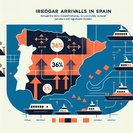
On 3 November, specialist immigration portal Entre Trámites published an updated, practitioner-focused guide to Spain’s Digital-Nomad Visa (DNV). The article consolidates the higher income thresholds that took effect in January—€2,762 gross per month for single applicants (200 % of the Spanish minimum wage), €3,798 for couples and an additional €346 per dependent child.
The guide breaks down documentary evidence now required by consulates and extranjería offices: six months of bank statements, proof of at least three months’ remote-work history, and private health insurance that covers teleworkers throughout the EU. It also clarifies the 20 % cap on Spanish-source income and the new four-year renewal period introduced in May’s Immigration Regulation.
![Digital-Nomad Visa guide updates published as Spain tightens income thresholds]()
For companies running remote-first talent programmes, the article is a timely compliance checklist. Mobility managers are advised to align employment contracts with the 80/20 foreign-income rule and to brief payroll teams on potential Non-Resident Income Tax exposures. The guide stresses that DNV holders can now switch to standard employee residence permits after one year, creating an on-ramp to Spain’s labour market just as the government phases out golden visas.
Lawyers interviewed warn that consulates have increased scrutiny of freelance invoices and that rejection rates are rising—especially for applicants whose income is paid in crypto or via newly formed companies. Applicants are urged to translate all documents into Spanish and to obtain Hague-apostilled police certificates no older than 90 days.
The guide breaks down documentary evidence now required by consulates and extranjería offices: six months of bank statements, proof of at least three months’ remote-work history, and private health insurance that covers teleworkers throughout the EU. It also clarifies the 20 % cap on Spanish-source income and the new four-year renewal period introduced in May’s Immigration Regulation.

For companies running remote-first talent programmes, the article is a timely compliance checklist. Mobility managers are advised to align employment contracts with the 80/20 foreign-income rule and to brief payroll teams on potential Non-Resident Income Tax exposures. The guide stresses that DNV holders can now switch to standard employee residence permits after one year, creating an on-ramp to Spain’s labour market just as the government phases out golden visas.
Lawyers interviewed warn that consulates have increased scrutiny of freelance invoices and that rejection rates are rising—especially for applicants whose income is paid in crypto or via newly formed companies. Applicants are urged to translate all documents into Spanish and to obtain Hague-apostilled police certificates no older than 90 days.











